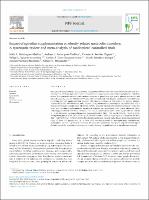| dc.contributor.author | Bohórquez Medina, Sofía L. | |
| dc.contributor.author | Bohórquez Medina, Andrea L. | |
| dc.contributor.author | Benites Zapata, Vicente A. | |
| dc.contributor.author | Ignacio Cconchoy, Felipe L. | |
| dc.contributor.author | Toro Huamanchumo, Carlos J. | |
| dc.contributor.author | Bendezu Quispe, Guido | |
| dc.contributor.author | Pacheco Mendoza, Josmel | |
| dc.contributor.author | Hernandez, Adrian V. | |
| dc.date.accessioned | 2023-03-23T16:53:37Z | |
| dc.date.available | 2023-03-23T16:53:37Z | |
| dc.date.issued | 2021-11 | |
| dc.identifier.citation | NFS Journal | es_PE |
| dc.identifier.issn | 2352-3646 | |
| dc.identifier.uri | https://hdl.handle.net/20.500.12959/3498 | |
| dc.description.abstract | Spirulina is a cyanobacterium rich in proteins, polyunsaturated fatty acids, and bioactive compounds, such as C-phycocyanin, which has anti-inflammatory and antioxidant properties and possible lipid and glucose metabolism effects. This systematic review aimed to analyze the effects of spirulina on lipid profile, glucose metabolism, and anti-inflammatory markers (CRD42018097156). After systematically searching for randomized controlled trials evaluating spirulina supplementation in adults with obesity, diabetes, or dyslipidemia on Scopus, Embase, PubMed/MEDLINE, Web of Science, and Cochrane Library databases and assessing the risk of bias (Rob 2.0), a random-effects meta-analysis (Mean Difference, CI 95%) was conducted on seven selected articles (n = 338). We found that spirulina supplementation significantly reduced the triglycerides (TG) (mean difference (MD): −15.34 mg/dL; 95% CI: −29.76 to −0.91) and total cholesterol (TC) levels (MD: −11.83 mg/dL; 95% CI: −20.56 to −3.10). However, low-density lipoprotein cholesterol (LDL-C) (MD: −7.80 mg/dL; 95% CI: −16.94 to 1.33), fasting blood glucose (FBS) (MD: −3.38 mg/dL; 95% CI: −9.88 to 3.12), and glycosylated hemoglobin (HbA1c) (MD: −0.27%; 95% CI: −0.94 to 0.39) levels were not significantly reduced. High-density lipoprotein cholesterol (HDLsingle bondC) (MD: 0.73 mg/dL; 95% CI: −2.49 to 3.94) was also increased but not significantly. Spirulina supplementation resulted in a decrease in TG and TC levels; it improved the lipid profile of patients with type 2 diabetes, metabolic syndrome, overweight, or obesity, showing its significant role as an adjuvant treatment. | es_PE |
| dc.format | application/pdf | es_PE |
| dc.language.iso | eng | es_PE |
| dc.publisher | Society of Nutrition and Food Science | es_PE |
| dc.relation.uri | https://www.sciencedirect.com/science/article/pii/S2352364621000237 | es_PE |
| dc.rights | info:eu-repo/semantics/openAccess | es_PE |
| dc.rights.uri | https://creativecommons.org/licenses/by-nc-sa/4.0/ | es_PE |
| dc.subject | Spirulina | es_PE |
| dc.subject | Lipid disorder | es_PE |
| dc.subject | Obesity | es_PE |
| dc.subject | Systematic review | es_PE |
| dc.subject | Meta analysis | es_PE |
| dc.subject | Espirulina | es_PE |
| dc.subject | Trastorno de lípidos | es_PE |
| dc.subject | Obesidad | es_PE |
| dc.subject | Revisión sistemática | es_PE |
| dc.subject | Metanálisis | es_PE |
| dc.title | Impact of spirulina supplementation on obesity-related metabolic disorders: a systematic review and meta-analysis of randomized controlled trials | es_PE |
| dc.title.alternative | Impacto de la suplementación con espirulina en los trastornos metabólicos relacionados con la obesidad: una revisión sistemática y un metanálisis de ensayos controlados aleatorios | es_PE |
| dc.type | info:eu-repo/semantics/article | es_PE |
| dc.subject.ocde | https://purl.org/pe-repo/ocde/ford#3.02.18 | es_PE |
| dc.identifier.doi | https://doi.org/10.1016/j.nfs.2021.09.003 | |






